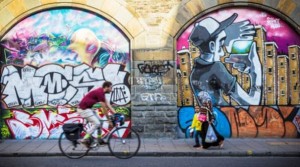Bristol has been named as the UK’s second ‘most progressive’ city for its residents’ forward-looking approach in areas such as recycling and their taste for vegan and vegetarian food.
Bristolians also helped their city challenge for the top spot – held by near neighbour Bath – in the 50-strong league table due their ownership of environmentally friendly cars and strong turn out in elections. 
The city’s relatively narrow gender pay gap and the high proportion of women employed by Bristol City Council also added to Bristol’s overall score in the rankings, which were based on a survey by Banknote, the US financial services group that also operates in the UK.
It analysed seven factors – a city’s Google search trends, gender pay gap, recycling rates, voter turnout, number of vegan and vegetarian restaurants, number of ultra-low emission vehicles and percentage of women in its local government – awarding points out of five for each and giving each city an overall score out of 35.
Bristol leapt into the number two place in this year’s table from sixth place last time with a score of 25.2, just 0.2 points behind Bath.
Last year’s winning city Oxford slipped down the rankings, as did Brighton and Hove – a city often viewed as a bastion of green living. 
Bristol scored highly for its recycling rates – although at 3.8 points it was a long way behind Bath’s score of 4.7 - and for its gender pay gap and number of women employed by its council, although both of these were behind third-placed Leicester.
It also had one of the best scores for its search trends – the Banknote survey looked for words and terms such as LGBT, fair trade, volunteering, climate change, feminism, protest, sustainability, charity, human rights and politics as proof of a progressive city.
Banknote said the survey was designed to gauge how the progressive mindsets of a city’s inhabitants shape daily life, giving a ‘wokeness’ score for each by using key data points relating to social and environmental issues.
This ‘wokeness’ was defined not only by its recognition of the issues, but how the city addresses them and enables positive change, it said.
“Whether it’s a green-minded commitment to recycling, a strong voter turnout, or ensuring that the ethnic diversity of the city is represented in local government, these cities have not just woken up to their duty to encourage a socially aware community, but they are staying woke by ensuring continued progress,” Banknote said.
“The wokeness of a city can be monitored not only by its politics, but also through the kinds of shops, services and facilities that exist; the kinds of events that take place; the way the area is designed; and the way the community engages with these issues.”
Image courtesy of Visit England






























